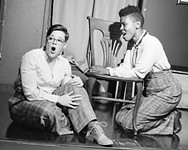Process at the Hideout Theatre
This improvised spoof of a play in production conjured an old-school realistic drama with spot-on symbolism and overinflated egos
Reviewed by Robert Faires, Fri., July 8, 2016
To have not seen the recent local staging of the tragedy Farm in the Darkness is to have missed a work of theatre that, I feel confident saying, is unlike anything else in the annals of 20th century American realism. Had a drunken Eugene O'Neill and a sozzled William Inge collided in a Manhattan saloon and pages of some scripts they'd penned in the woozy depths of inebriation gotten hopelessly mixed together, the result might have been as confused and overwrought as what was shown on the Hideout Theatre stage. As it was, this tawdry tale of a clan suffering through drought, debt, and degradation in the Arkansas drylands was just a hog trough of hoary cliches from the heyday of American realism in which the cast wallowed from curtain up to curtain down.
Which was what made it so delightful. And which was, naturally, the point.
Farm in the Darkness was, you see, a complete invention of the cast of Process, a show that tracks the production of an unscripted scripted play – that is, a play that doesn't really exist but which the performers treat as though it does – from auditions through performance. For each show, the theatrical style that Process' company will work in – Shakespeare, Mamet, musical, etc. – has been chosen, and the title is suggested by the audience, but everything else that happens is improvised, including the half-hour final act of the play being staged, replete with set-pieces, sound effects, costumes, and props.
So it was with Farm in the Darkness, which was intended as a goof on the plays that dominated American stages a few generations back. It first took shape in the comments of director Charles Weber (Michael Joplin) as he assigned roles to the six actors who had auditioned for him in the opening scene. His outline of life in pathetic Pig Snout, Ark., where Old Man and Old Woman Billburr were fighting to keep their failing farm (and daughter Maggie Lou) out of the clutches of Banker Betty just as a mysterious drifter was striking sparks with their blind daughter Evelyn, gave the cast a solid narrative foundation, with numerous tropes from the kinds of rural-wasteland dramas that earned Inge and O'Neill their Pulitzers. And in adding plot developments like poor Maggie Lou losing both her legs and being forced into prostitution after her folks sell her to Banker Betty, the cast took those tropes to town – or, as with Curtis Luciani as Old Man Billburr, beyond the horizon; Luciani's over-the-top rants against human sin and a vindictive God, punctuated with faux Bible verses, were hilariously spot-on for O'Neill's deadly earnest early work. In places, the narrative stumbled as performers tried introducing a new character or story element without making it clear to their scene partners, but overall, the team succeeded in spinning a yarn with the anguish, melodrama, and weighty symbolism of an old-school realistic drama.
But this isn't only about the script. As the title indicates, it's about the process. And with the show's structure including auditions, a table read, and a rehearsal, the audience has plenty of opportunities to see the artists behind the scenes and how they work. The Farm in the Darkness ensemble included an imperious grande dame (Courtney Hopkin) who had known the director since he was a boy and relished lording it over him; a bubbly but unskilled ingenue (Kaci Beeler) who had auditioned many times but had never been cast; and a purist Method type (Luciani) who refused to do anything "dishonest," including speak in an accent and call other actors by their character names. In the thespians' sense of self-importance, their inability to let go of their individual processes, and their tangled personal histories, as well as the director's efforts to puncture their overinflated egos, you can spy the DNA of backstage satires like Waiting for Guffman and Noises Off. And as with those shows, much of the fun here is seeing how these characters play their characters in the unscripted scripted play. Beeler took this the furthest in Farm in the Darkness, giving us an interpretation of the hapless (and legless) Maggie Lou that seemed born of the inexperienced actress Marcy more than Beeler and was evident in her rookie stage moves, like always delivering her lines facing the audience, no matter where the actor she addressed was standing. More of that layering of character on character would sure heighten Process' pleasures, but it was such an enjoyable lampoon of all things theatrical the other night that I'm already plotting a return visit.
Process
The Hideout Theatre, 607 Congress, 512-478-5282www.hideouttheatre.com
Through Aug. 27
Running time: 1 hr., 35 min.













